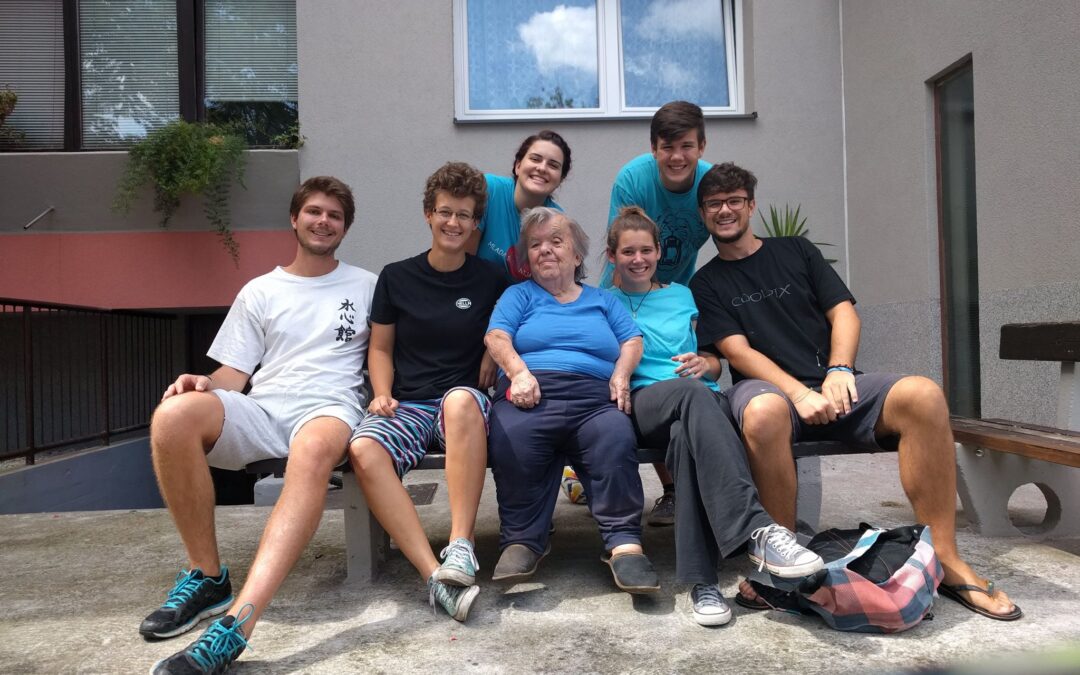
Oct 20, 2016 | Non categorizzato
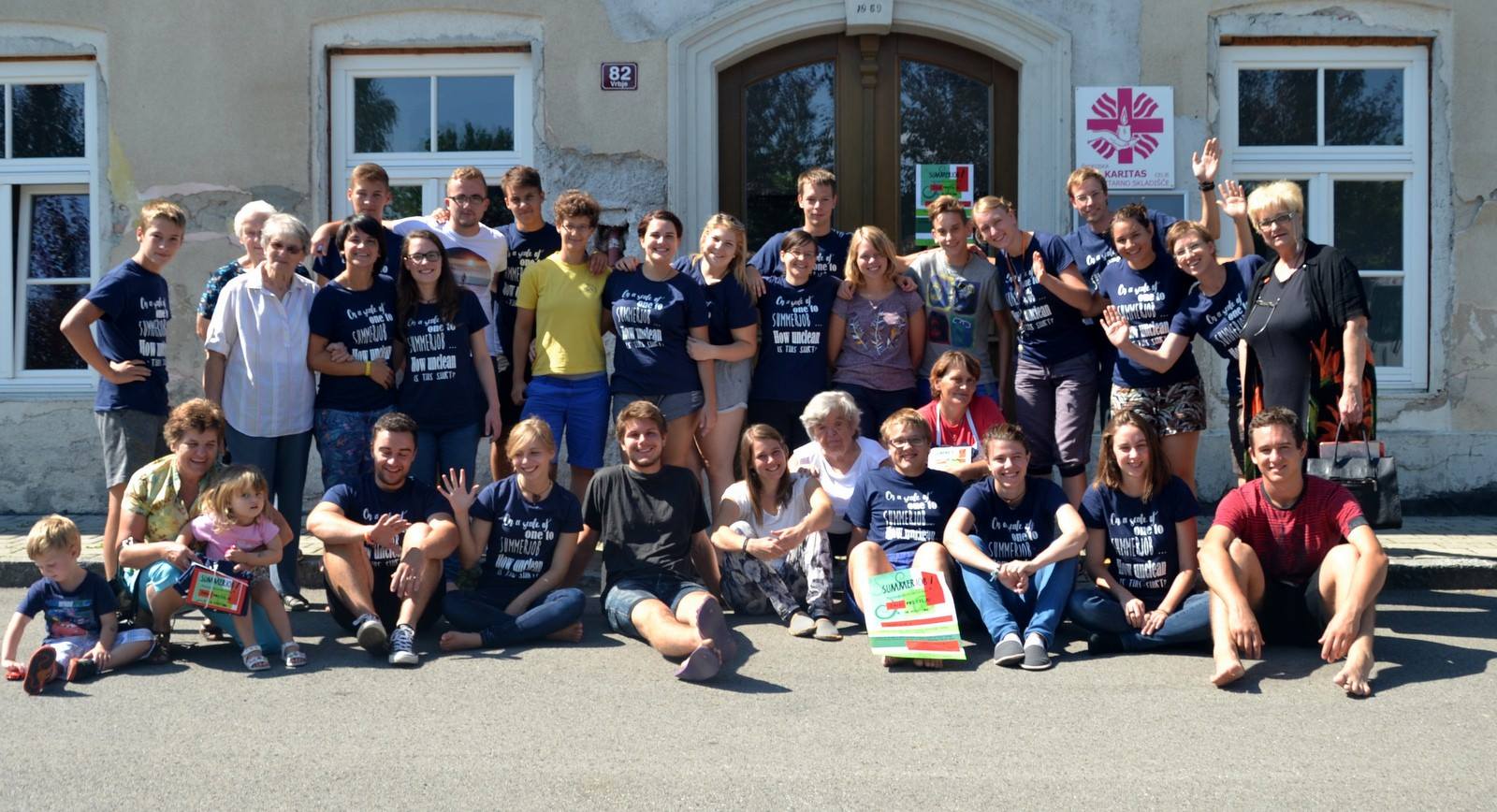 The International Day for the eradication of Poverty was commemorated on 17 October. It was instituted by Father Wresinki in 1987, when he organized a great human rights demonstration in Paris. Poverty is manifested in various ways, incarnating situations, places and entire populations. We will never get used to the fact that there are human beings who cannot enjoy a life worth living. In winter the Youths for a United World of Slovenia dedicate themselves – among other activities – to organising “Summer jobs,” in a summer work camp: in pursuit of the needs of the place, to make various contacts with the mayors, bishops, parish priests and persons of a given locality, to see how they can give their own contribution during summer, to help people in need. This year, in collaboration with the local Caritas association, people and families who needed very concrete help were sought out.
The International Day for the eradication of Poverty was commemorated on 17 October. It was instituted by Father Wresinki in 1987, when he organized a great human rights demonstration in Paris. Poverty is manifested in various ways, incarnating situations, places and entire populations. We will never get used to the fact that there are human beings who cannot enjoy a life worth living. In winter the Youths for a United World of Slovenia dedicate themselves – among other activities – to organising “Summer jobs,” in a summer work camp: in pursuit of the needs of the place, to make various contacts with the mayors, bishops, parish priests and persons of a given locality, to see how they can give their own contribution during summer, to help people in need. This year, in collaboration with the local Caritas association, people and families who needed very concrete help were sought out. 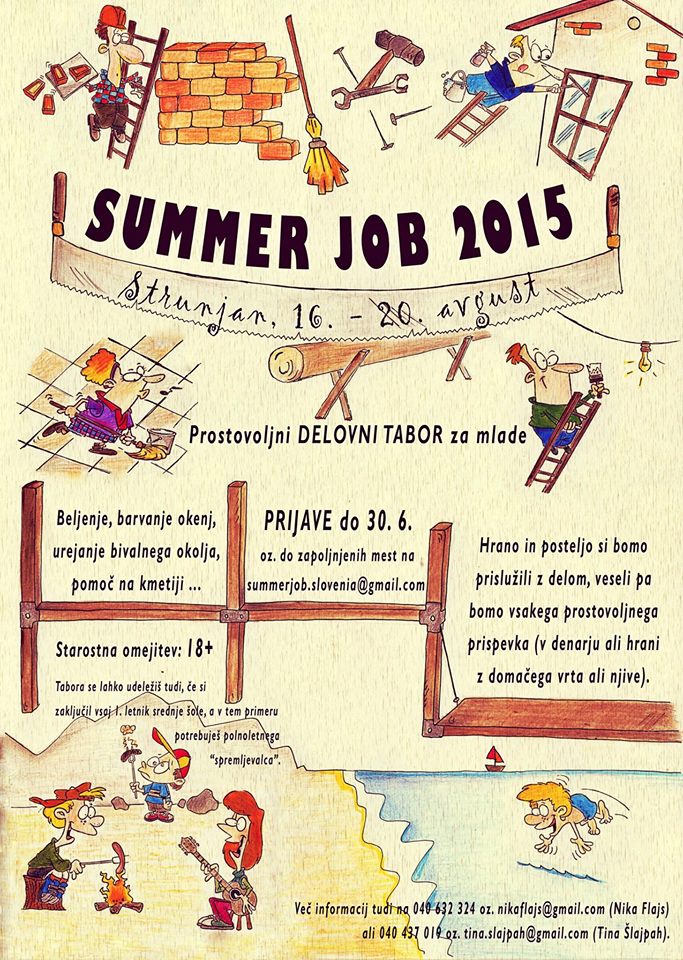 They organised an end-of-summer event from 15 to 20 August in Vrbje, a small village close to Celje. This third edition saw the opening of nine work sites. About 40 people dedicated themselves, seven hours a day, to many activities such as work in the fields, renovation of the courtyard of a house, construction of a chicken coop, restructuring of a disabled woman’s home, preparing aid for the population of Macedonia struck by floods or whitewashing the house of a woman living in miserable conditions. This was all a specific way of putting fraternity into practice, weaving deep relationships with the local folks, and restoring to many, that dignity they often feel to have lost. The decision to share some of the situations and try to bring relief to those who live at the outskirts of society is a demanding choice which requires time and energy, but it is above all the choice to give of oneself that started up the initiative.
They organised an end-of-summer event from 15 to 20 August in Vrbje, a small village close to Celje. This third edition saw the opening of nine work sites. About 40 people dedicated themselves, seven hours a day, to many activities such as work in the fields, renovation of the courtyard of a house, construction of a chicken coop, restructuring of a disabled woman’s home, preparing aid for the population of Macedonia struck by floods or whitewashing the house of a woman living in miserable conditions. This was all a specific way of putting fraternity into practice, weaving deep relationships with the local folks, and restoring to many, that dignity they often feel to have lost. The decision to share some of the situations and try to bring relief to those who live at the outskirts of society is a demanding choice which requires time and energy, but it is above all the choice to give of oneself that started up the initiative. 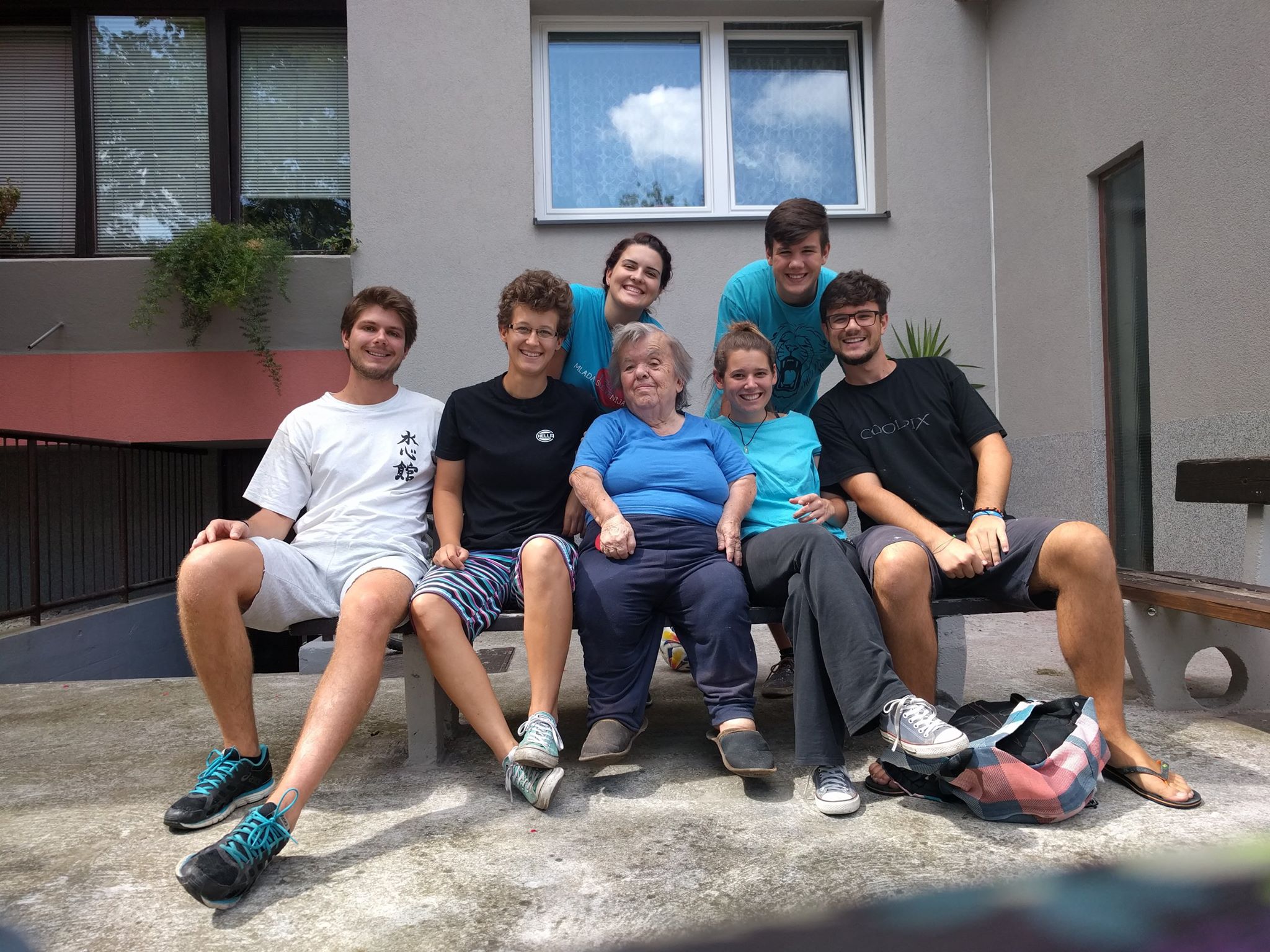 Some of the participating youths wrote about their deep impressions: «It was precisely the more difficult jobs that made us understand how most of the time, relational problems lie at the roots of poverty. For example, with a woman, even if our work had already been defined, we spent more time on the first day, only in getting to know each other, so she could trust us. Only later did she allow us to work on her apartment which needed all sorts of things». There was a lot of time for listening, speaking with many and having an exchange of experiences, worries, and future projects. All this came about in an atmosphere in which all helped each other in utmost readiness, and as a consequence, with the fullness of joy. But the Summerjob did not only consist in work: in the evening everyone shared the experiences lived during the day, and these were solemn, engaging moments that bound and united the participants more and more. Other impressions were: «Upon saying goodbye on the last day with the “employers” we suggested having coffee together to see the photos of the summer camp. It was a mystery what we managed to build in just four days. It was a really impressive moment! Just to think that in the end, the person who receives more is always the one who gives with joy. See the page on facebook of the Summerjob Slovenia 2016
Some of the participating youths wrote about their deep impressions: «It was precisely the more difficult jobs that made us understand how most of the time, relational problems lie at the roots of poverty. For example, with a woman, even if our work had already been defined, we spent more time on the first day, only in getting to know each other, so she could trust us. Only later did she allow us to work on her apartment which needed all sorts of things». There was a lot of time for listening, speaking with many and having an exchange of experiences, worries, and future projects. All this came about in an atmosphere in which all helped each other in utmost readiness, and as a consequence, with the fullness of joy. But the Summerjob did not only consist in work: in the evening everyone shared the experiences lived during the day, and these were solemn, engaging moments that bound and united the participants more and more. Other impressions were: «Upon saying goodbye on the last day with the “employers” we suggested having coffee together to see the photos of the summer camp. It was a mystery what we managed to build in just four days. It was a really impressive moment! Just to think that in the end, the person who receives more is always the one who gives with joy. See the page on facebook of the Summerjob Slovenia 2016
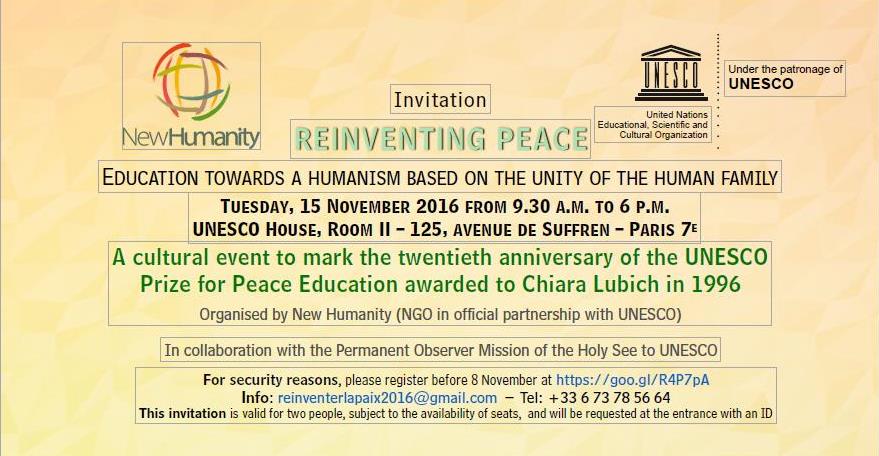
Oct 19, 2016 | Non categorizzato
 The wars which for too many years have been devastating continents that are only sea distance away from Europe have come into our home, and now terrorism has become the last frontier. And it is in France, one year after the terrible massacre at the Bataclan that the challenge of peace is being relaunched. On 17 December 1996, in Paris, Chiara Lubich received the UNESCO Prize for Peace Education in recognition for a life spent in the dissemination of a culture of unity and peace and the formation of thousands and thousands of people of every race and latitude. The Focolare Movement has been present at UNESCO through its New Humanity NGO. The General Management of UNESCO and the Holy See’s Permanent Observer wished to reaffirm and testify to their commitment to unity and peace by proposing a day of reflection and testimony in five areas: Education, the Common Good, Justice, Ecology and Art. Theme of the event Last April, at the United Nations in New York, Maria Voce proposed focusing on radical dialogue in the search for peace. She was speaking at a debate on the promotion of tolerance and reconciliation: “[Dialogue] is risky, demanding, challenging, aimed at severing the roots of misunderstanding, fear and resentment.” The challenge of dialogue is timelier than ever. It is the starting point for creating the mosaic of peace, one day at a time, one tile at a time. It is the way to build a planet where there is a mutual recognition of identity and diversity, the mending of the social fabric, new attention to the needy, to justice, to human dignity and to sharing the world’s goods. The very word peace draws its deepest meaning from its Sanskrit root pak, which means join, unite. Committing oneself to reinventing peace means creating connections that will require the involvement of human, intellectual and institutional resources. It means calling upon the world economy, international law and peace education at all levels. It means valuing cultural diversity, that is, the invaluable identity of every people. It means equipping the new generations for a culture of dialogue and encounter. It means facing up to the refugee crisis concretely. It means protecting the environment, opposing corruption and promoting the rule of law at every level. It means halting the increase in military spending and the arms trade. It means coming up with a new security plan, stability and cooperation for the Middle East. Program and speakers The event will be attended by members of the diplomatic world, experts on international relations and the peace process and representatives from New Humanity and the Focolare Movement. The first session, titled Chiara Lubich, Peace Education, will be introduced by representatives from UNESCO and by Msgr Francesco Follo, Permanent Observer of the Holy See. This will be followed by presentations from Maria Voce and Jesús Morán, president and co-president of the Focolare Movement. The second session – Five paths for peace education on five continents – will carry on with examples of best practices from around the world. In the afternoon there will be an open session titled Dialogue, the remedy for the world’s problems, which will be opened by former Italian Prime Minister, Enrico Letta, and current president of the Jacques Delors Institute. Then there will be two moments of discussion on religions, economy and politics.
The wars which for too many years have been devastating continents that are only sea distance away from Europe have come into our home, and now terrorism has become the last frontier. And it is in France, one year after the terrible massacre at the Bataclan that the challenge of peace is being relaunched. On 17 December 1996, in Paris, Chiara Lubich received the UNESCO Prize for Peace Education in recognition for a life spent in the dissemination of a culture of unity and peace and the formation of thousands and thousands of people of every race and latitude. The Focolare Movement has been present at UNESCO through its New Humanity NGO. The General Management of UNESCO and the Holy See’s Permanent Observer wished to reaffirm and testify to their commitment to unity and peace by proposing a day of reflection and testimony in five areas: Education, the Common Good, Justice, Ecology and Art. Theme of the event Last April, at the United Nations in New York, Maria Voce proposed focusing on radical dialogue in the search for peace. She was speaking at a debate on the promotion of tolerance and reconciliation: “[Dialogue] is risky, demanding, challenging, aimed at severing the roots of misunderstanding, fear and resentment.” The challenge of dialogue is timelier than ever. It is the starting point for creating the mosaic of peace, one day at a time, one tile at a time. It is the way to build a planet where there is a mutual recognition of identity and diversity, the mending of the social fabric, new attention to the needy, to justice, to human dignity and to sharing the world’s goods. The very word peace draws its deepest meaning from its Sanskrit root pak, which means join, unite. Committing oneself to reinventing peace means creating connections that will require the involvement of human, intellectual and institutional resources. It means calling upon the world economy, international law and peace education at all levels. It means valuing cultural diversity, that is, the invaluable identity of every people. It means equipping the new generations for a culture of dialogue and encounter. It means facing up to the refugee crisis concretely. It means protecting the environment, opposing corruption and promoting the rule of law at every level. It means halting the increase in military spending and the arms trade. It means coming up with a new security plan, stability and cooperation for the Middle East. Program and speakers The event will be attended by members of the diplomatic world, experts on international relations and the peace process and representatives from New Humanity and the Focolare Movement. The first session, titled Chiara Lubich, Peace Education, will be introduced by representatives from UNESCO and by Msgr Francesco Follo, Permanent Observer of the Holy See. This will be followed by presentations from Maria Voce and Jesús Morán, president and co-president of the Focolare Movement. The second session – Five paths for peace education on five continents – will carry on with examples of best practices from around the world. In the afternoon there will be an open session titled Dialogue, the remedy for the world’s problems, which will be opened by former Italian Prime Minister, Enrico Letta, and current president of the Jacques Delors Institute. Then there will be two moments of discussion on religions, economy and politics.
More information: Unesco – New Humanity Rome: Tel: +39 06 94798133/+39 338 2640371; info.unesco2016@focolare.org Paris: Tél: +33 6 73 78 56 64 Email: reinventerlapaix2016@gmail.com Invitation download – Registration: https://goo.gl/R4P7pA
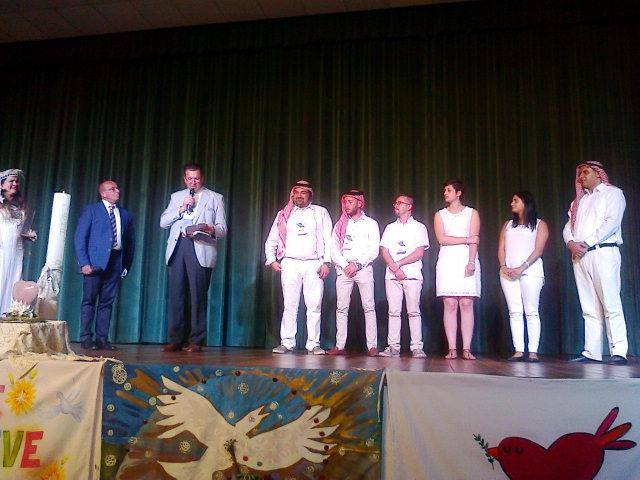
Oct 18, 2016 | Non categorizzato
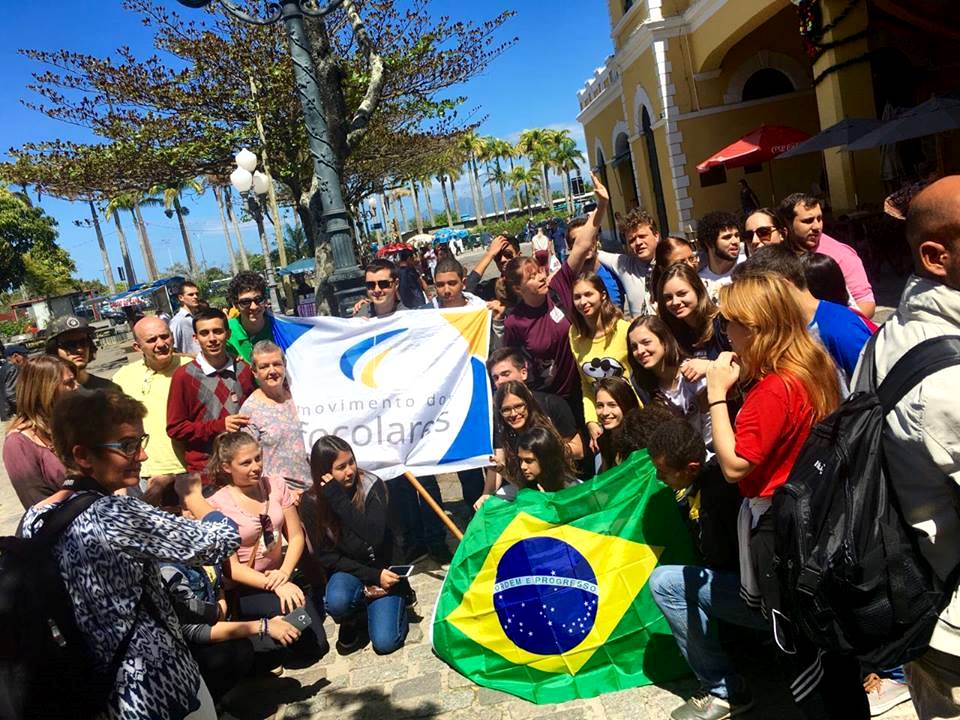 The tenth World Peace Forum and the second Youth World Peace Forum were held at Florianópolis, Brazil on September 22-15, 2016. Some events were held in common and others distinctly. The forum was attended by 1,500 adults and young people from 60 countries, different cultures and various religious faiths. “We Believe” was the main theme which was articulated: “We believe in change,” with a day dedicated to ecology; “We believe in human rights,” with a day dedicated to humanity; and “We believe in peace,’ with a day dedicated to education. The opening ceremony was held on September 21 in the plaza outside the Cathedral, with 400 dancers. Among the five flags that were waved during the dance there was also that of the Focolare Movement. The ceremony was marked by a deep atmosphere of prayer for peace. On September 22 there was a peace march through the city streets, with adults, teenagers and children. President of the Youth Global Peace Forum, Carlos Palma, commented: “It was very moving to see Chiara Lubich’s name written on the door of one of the halls, with the title “Peacebuilder” that had been given to her by UNESCO in 1996 for Peace Education.”
The tenth World Peace Forum and the second Youth World Peace Forum were held at Florianópolis, Brazil on September 22-15, 2016. Some events were held in common and others distinctly. The forum was attended by 1,500 adults and young people from 60 countries, different cultures and various religious faiths. “We Believe” was the main theme which was articulated: “We believe in change,” with a day dedicated to ecology; “We believe in human rights,” with a day dedicated to humanity; and “We believe in peace,’ with a day dedicated to education. The opening ceremony was held on September 21 in the plaza outside the Cathedral, with 400 dancers. Among the five flags that were waved during the dance there was also that of the Focolare Movement. The ceremony was marked by a deep atmosphere of prayer for peace. On September 22 there was a peace march through the city streets, with adults, teenagers and children. President of the Youth Global Peace Forum, Carlos Palma, commented: “It was very moving to see Chiara Lubich’s name written on the door of one of the halls, with the title “Peacebuilder” that had been given to her by UNESCO in 1996 for Peace Education.” 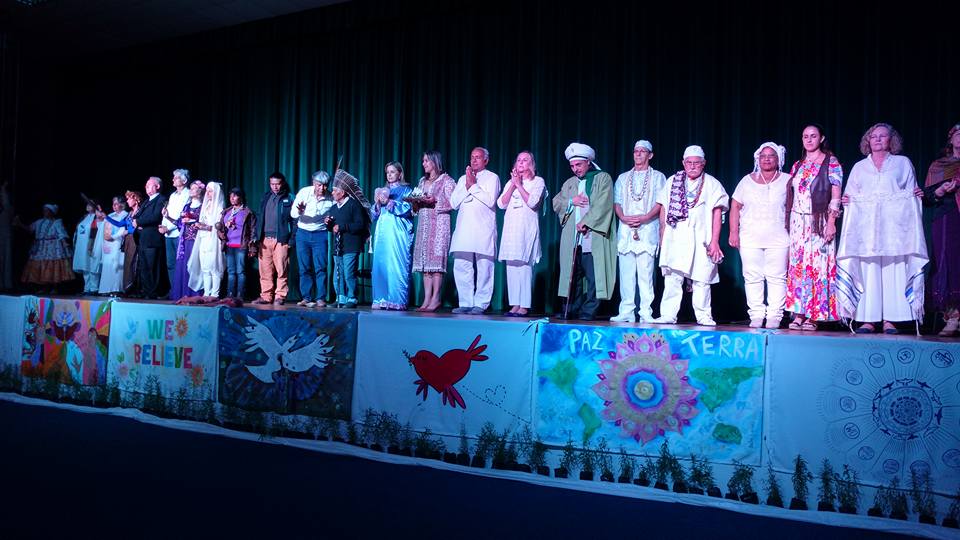 The young people’s forum was an explosion of life, with touching testimonies and presentations of their many projects and personal experiences in being committed to peace. On September 23, an additional 500 young people from around the world were linked up via web for the World Conference of Young People for Peace, which is part of Living Peace International in collaboration with Peace Pals International (New York, USA). The Global Peace Forum concluded on September 25 with a profound inter-religous prayer with 30 representatives from different religious and spiritual traditions. An important part of the programme was devoted to Peace Education, during which Living Peace was presented. The presentation and history of this project, how it has spread throughout the world and its teaching method, was accompanied by a series of testimonies by Brazilian, Spanish, Paraguayan and North American young people, and others.
The young people’s forum was an explosion of life, with touching testimonies and presentations of their many projects and personal experiences in being committed to peace. On September 23, an additional 500 young people from around the world were linked up via web for the World Conference of Young People for Peace, which is part of Living Peace International in collaboration with Peace Pals International (New York, USA). The Global Peace Forum concluded on September 25 with a profound inter-religous prayer with 30 representatives from different religious and spiritual traditions. An important part of the programme was devoted to Peace Education, during which Living Peace was presented. The presentation and history of this project, how it has spread throughout the world and its teaching method, was accompanied by a series of testimonies by Brazilian, Spanish, Paraguayan and North American young people, and others.  The conferral of the Luxembourg Peace Prize to the young Omar Aobou Baker from Cairo, Egypt and member of Living Peace International, was particularly moving. The next Global Peace Forum will be held in Amman, Jordan, September 2017 with adults; and another in Manila, Philippines, organized by the young people in conjunction with the 2018 Genfest. The solemn signing of the Florianópolis Letter of Intent, titled 1% for Peace, brought the conference to an honorable conclusion. This document proposes that private and public entities destine 1% of their internal and external security spending to financing peace education projects. Eliana Quadro, a young woman Volunteer from the Focolare in Florianópolis, received the Commandant of the Global Peace Forum Silver Medal in recognition of her efforts in producing the event. “The Forum was characterized by the deep relationships that were created,” Carlos Palma concluded, “by the great joy in everyone’s hearts and, above all, by the immense gratitude to God and to the charism of Chiara Lubich that projects us towards humanity and makes us builders of peace and unity.”
The conferral of the Luxembourg Peace Prize to the young Omar Aobou Baker from Cairo, Egypt and member of Living Peace International, was particularly moving. The next Global Peace Forum will be held in Amman, Jordan, September 2017 with adults; and another in Manila, Philippines, organized by the young people in conjunction with the 2018 Genfest. The solemn signing of the Florianópolis Letter of Intent, titled 1% for Peace, brought the conference to an honorable conclusion. This document proposes that private and public entities destine 1% of their internal and external security spending to financing peace education projects. Eliana Quadro, a young woman Volunteer from the Focolare in Florianópolis, received the Commandant of the Global Peace Forum Silver Medal in recognition of her efforts in producing the event. “The Forum was characterized by the deep relationships that were created,” Carlos Palma concluded, “by the great joy in everyone’s hearts and, above all, by the immense gratitude to God and to the charism of Chiara Lubich that projects us towards humanity and makes us builders of peace and unity.”
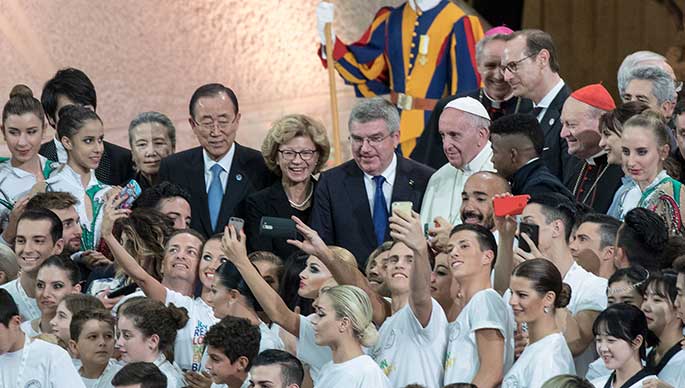
Oct 17, 2016 | Non categorizzato
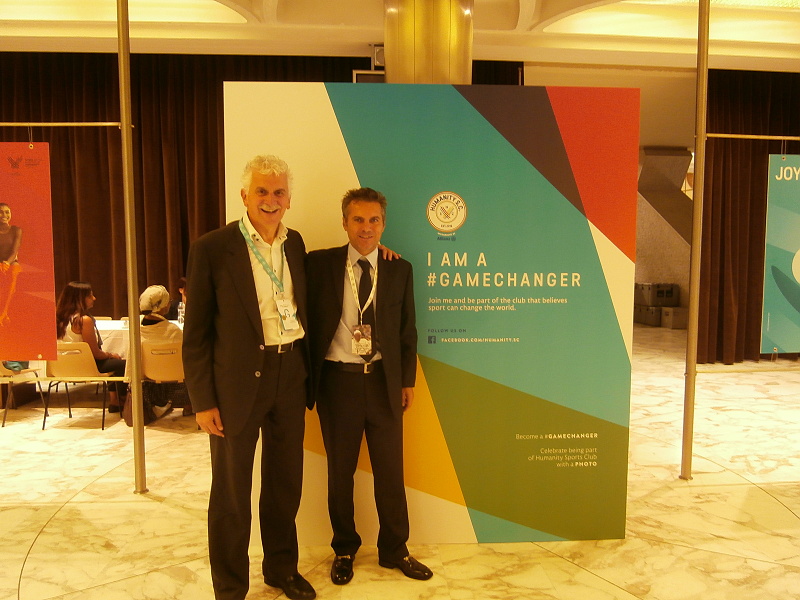
Paolo Crepaz and Paolo Cipolli
 The 300 delegates who gave a very important contribution to the convention were of various ethnic groups, cultures and religions, representing sportive and non-sportive international organizations, governments, associations and NGOs of companies involved in the variegated world of sports. The moments of reflection, in-depth study of themes, testimonials, and work groups, focused on the irreplaceable and important role of sports in serving humanity. Paolo Crepaz of Sportmeet underlined: «All were overjoyed to have participated and contributed to a historical event due to the novelty of the great attention the Church pays to the world of Sports.» At the conclusion, the athletes solemnly affixed their signatures to symbolise their commitment to becoming game changers,” to form and promote a global network in the conviction that sports can change the world. See: cittanuova.it
The 300 delegates who gave a very important contribution to the convention were of various ethnic groups, cultures and religions, representing sportive and non-sportive international organizations, governments, associations and NGOs of companies involved in the variegated world of sports. The moments of reflection, in-depth study of themes, testimonials, and work groups, focused on the irreplaceable and important role of sports in serving humanity. Paolo Crepaz of Sportmeet underlined: «All were overjoyed to have participated and contributed to a historical event due to the novelty of the great attention the Church pays to the world of Sports.» At the conclusion, the athletes solemnly affixed their signatures to symbolise their commitment to becoming game changers,” to form and promote a global network in the conviction that sports can change the world. See: cittanuova.it
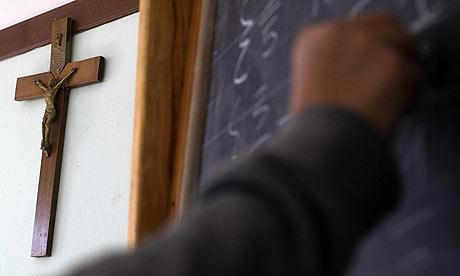
Oct 16, 2016 | Non categorizzato
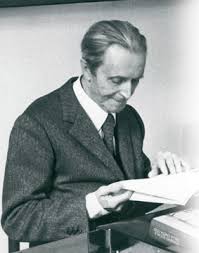 “Teaching is like lighting a flame, not filling an empty vessel. If it is a flame that needs to be fed, then a learner should be taught to guard and increase the warmth and light. A person needs an education that outlasts childhood and continues from birth to death – and that is the period for giving.” Giordani was a writer and journalist, a man of politics but also a formidable educator. His writings were intended to teach, to teach citizens the path of justice. Many were raised on Giordani’s writings during the difficult period of cultural resistance to Fascism and during the Cold War. Giordani taught by living and then writing. In his opinion education should be a universal endeavour that engages the whole citizenry. The function of education is to instill two fundamental skills: freedom and responsibility. Referring to an image used by Plutarch, for Giordani, teaching meant lighting a flame and creating the conditions for the learner to know how to keep it constantly alive. The focus of the learning process would thus be shifted from teacher to learner and from childhood to the entire lifespan. “In the natural order the teachers are the family and the State; in the supernatural order, the Church. When these collaborate toward the same goal – cooperating rather than bumping into each other – education achieves its full effect. Individuals and crowds are not stupefied and neutral in front of their personal destiny, but they face it with courage and you have those epochal periods of great undertakings for peace and for war, for thought and for action. The family is not a mere roost, orphanage or corporate housing: it is a church and a school. Parents have a natural right – therefore from God – to teach that goes beyond generating and nourishing children; an inalienable right that comes before every other civil right.
“Teaching is like lighting a flame, not filling an empty vessel. If it is a flame that needs to be fed, then a learner should be taught to guard and increase the warmth and light. A person needs an education that outlasts childhood and continues from birth to death – and that is the period for giving.” Giordani was a writer and journalist, a man of politics but also a formidable educator. His writings were intended to teach, to teach citizens the path of justice. Many were raised on Giordani’s writings during the difficult period of cultural resistance to Fascism and during the Cold War. Giordani taught by living and then writing. In his opinion education should be a universal endeavour that engages the whole citizenry. The function of education is to instill two fundamental skills: freedom and responsibility. Referring to an image used by Plutarch, for Giordani, teaching meant lighting a flame and creating the conditions for the learner to know how to keep it constantly alive. The focus of the learning process would thus be shifted from teacher to learner and from childhood to the entire lifespan. “In the natural order the teachers are the family and the State; in the supernatural order, the Church. When these collaborate toward the same goal – cooperating rather than bumping into each other – education achieves its full effect. Individuals and crowds are not stupefied and neutral in front of their personal destiny, but they face it with courage and you have those epochal periods of great undertakings for peace and for war, for thought and for action. The family is not a mere roost, orphanage or corporate housing: it is a church and a school. Parents have a natural right – therefore from God – to teach that goes beyond generating and nourishing children; an inalienable right that comes before every other civil right.  The family will educate if parents are not only educated, but aware of their mission to be teachers; if they are able to nurture in the souls of their children greater ideals than food, board and profession; if they act like a teaching domestic church. Religion is also there to remember, to lift up and protect the teaching obligation of the family. And politics should do likewise. The State is the other great educator and accomplishes its role through the school. Nowadays, States run their own schools, and it is there natural right to do so. But it would no longer be their right if they coerced religious conscience and perverted moral conscience; even worse if they prevented the Church from having her own schools.” “For what regards morality, education should be the same from family to State, from parish to workplace. It should draw on God’s law and construct human laws based on God’s law. The soul of such education is a transcendent faith that snatches individuals from the grip of individualism and joins them to one another with an impulse of justice and charity. As one great educator once said, ‘The real social culture was begun on Golgatha’.” (Igino Giordani, “Educazione e istruzione” in La società cristiana, Città Nuova, (1942) 2010, pp. 108 – 111).
The family will educate if parents are not only educated, but aware of their mission to be teachers; if they are able to nurture in the souls of their children greater ideals than food, board and profession; if they act like a teaching domestic church. Religion is also there to remember, to lift up and protect the teaching obligation of the family. And politics should do likewise. The State is the other great educator and accomplishes its role through the school. Nowadays, States run their own schools, and it is there natural right to do so. But it would no longer be their right if they coerced religious conscience and perverted moral conscience; even worse if they prevented the Church from having her own schools.” “For what regards morality, education should be the same from family to State, from parish to workplace. It should draw on God’s law and construct human laws based on God’s law. The soul of such education is a transcendent faith that snatches individuals from the grip of individualism and joins them to one another with an impulse of justice and charity. As one great educator once said, ‘The real social culture was begun on Golgatha’.” (Igino Giordani, “Educazione e istruzione” in La società cristiana, Città Nuova, (1942) 2010, pp. 108 – 111).
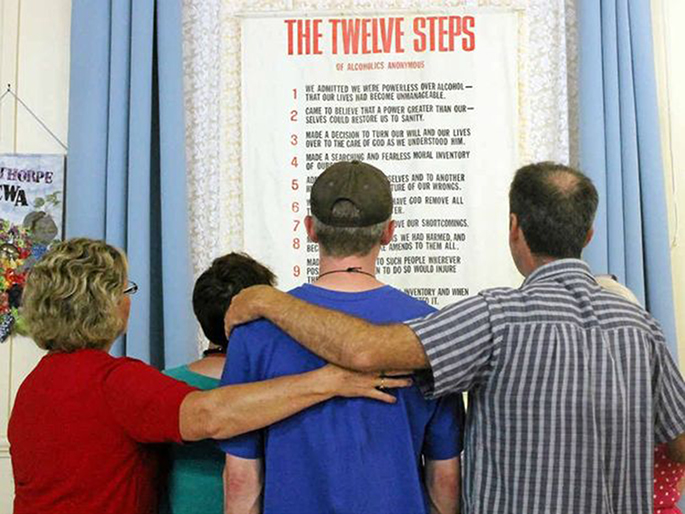
Oct 15, 2016 | Non categorizzato
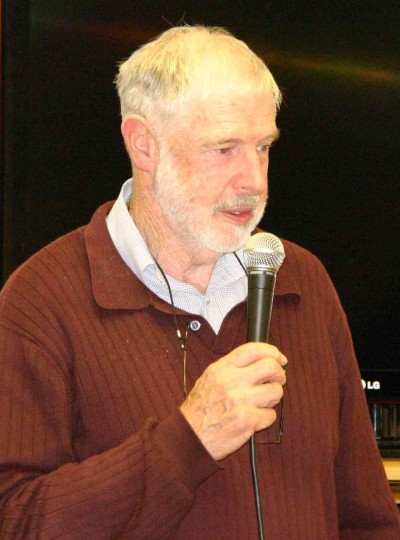
Kevin Kelly
 They were a very spiritual people and working with them, I felt a real bond and a sense of unity of purpose. These ex-alcoholics were very honest with themselves and with each other. Nearly all of them had obtained their sobriety through Alcoholics Anonymous which is a 12-step program. They were ruthless in their self-assessment and refused to give in to resentments and negative feelings. It was a real privilege working with them. At one stage I felt there was a lack of patience with repeat clients. Workers in the field of the homeless and destitute really felt comfortable with the way we respected their clients and used to send people to the centre to sober up. However, this meant that once they were rehabilitated they would often return to their old ways. This was difficult for the ex-alcoholics who invested so much in helping people to recover. In listening to them, I was able to share a maxim I had learned from Chiara Lubich – “to see each person new” – and to live it each time they came into the unit. I emphasized that when people came in again looking for help, we had to see them as though we were seeing them for the first time, even if they had been in many times before. Most of them managed to do this despite the pain it caused them. We had a victory when one fellow, who had a record number of admissions and who was treated by us as a new person each time, suddenly saw the light and gave up drinking altogether. To everyone’s amazement he went on to achieve long term sobriety and even started to help other people! Throughout this experience, I came to see the importance of suffering and the role it played in people’s development. By loving and accepting each person as they were, we were able to be more human in the way we responded to any situation.”
They were a very spiritual people and working with them, I felt a real bond and a sense of unity of purpose. These ex-alcoholics were very honest with themselves and with each other. Nearly all of them had obtained their sobriety through Alcoholics Anonymous which is a 12-step program. They were ruthless in their self-assessment and refused to give in to resentments and negative feelings. It was a real privilege working with them. At one stage I felt there was a lack of patience with repeat clients. Workers in the field of the homeless and destitute really felt comfortable with the way we respected their clients and used to send people to the centre to sober up. However, this meant that once they were rehabilitated they would often return to their old ways. This was difficult for the ex-alcoholics who invested so much in helping people to recover. In listening to them, I was able to share a maxim I had learned from Chiara Lubich – “to see each person new” – and to live it each time they came into the unit. I emphasized that when people came in again looking for help, we had to see them as though we were seeing them for the first time, even if they had been in many times before. Most of them managed to do this despite the pain it caused them. We had a victory when one fellow, who had a record number of admissions and who was treated by us as a new person each time, suddenly saw the light and gave up drinking altogether. To everyone’s amazement he went on to achieve long term sobriety and even started to help other people! Throughout this experience, I came to see the importance of suffering and the role it played in people’s development. By loving and accepting each person as they were, we were able to be more human in the way we responded to any situation.”
Experience shared by Kevin Kelly at the Health Symposium “Darkness to Light – Spirituality of Unity in Chronic Disease and Disability” Focolare Movement, Australia, July 2016

 The International Day for the eradication of Poverty was commemorated on 17 October. It was instituted by Father Wresinki in 1987, when he organized a great human rights demonstration in Paris. Poverty is manifested in various ways, incarnating situations, places and entire populations. We will never get used to the fact that there are human beings who cannot enjoy a life worth living. In winter the Youths for a United World of Slovenia dedicate themselves – among other activities – to organising “Summer jobs,” in a summer work camp: in pursuit of the needs of the place, to make various contacts with the mayors, bishops, parish priests and persons of a given locality, to see how they can give their own contribution during summer, to help people in need. This year, in collaboration with the local Caritas association, people and families who needed very concrete help were sought out.
The International Day for the eradication of Poverty was commemorated on 17 October. It was instituted by Father Wresinki in 1987, when he organized a great human rights demonstration in Paris. Poverty is manifested in various ways, incarnating situations, places and entire populations. We will never get used to the fact that there are human beings who cannot enjoy a life worth living. In winter the Youths for a United World of Slovenia dedicate themselves – among other activities – to organising “Summer jobs,” in a summer work camp: in pursuit of the needs of the place, to make various contacts with the mayors, bishops, parish priests and persons of a given locality, to see how they can give their own contribution during summer, to help people in need. This year, in collaboration with the local Caritas association, people and families who needed very concrete help were sought out.  They organised an end-of-summer event from 15 to 20 August in Vrbje, a small village close to Celje. This third edition saw the opening of nine work sites. About 40 people dedicated themselves, seven hours a day, to many activities such as work in the fields, renovation of the courtyard of a house, construction of a chicken coop, restructuring of a disabled woman’s home, preparing aid for the population of Macedonia struck by floods or whitewashing the house of a woman living in miserable conditions. This was all a specific way of putting fraternity into practice, weaving deep relationships with the local folks, and restoring to many, that dignity they often feel to have lost. The decision to share some of the situations and try to bring relief to those who live at the outskirts of society is a demanding choice which requires time and energy, but it is above all the choice to give of oneself that started up the initiative.
They organised an end-of-summer event from 15 to 20 August in Vrbje, a small village close to Celje. This third edition saw the opening of nine work sites. About 40 people dedicated themselves, seven hours a day, to many activities such as work in the fields, renovation of the courtyard of a house, construction of a chicken coop, restructuring of a disabled woman’s home, preparing aid for the population of Macedonia struck by floods or whitewashing the house of a woman living in miserable conditions. This was all a specific way of putting fraternity into practice, weaving deep relationships with the local folks, and restoring to many, that dignity they often feel to have lost. The decision to share some of the situations and try to bring relief to those who live at the outskirts of society is a demanding choice which requires time and energy, but it is above all the choice to give of oneself that started up the initiative.  Some of the participating youths wrote about their deep impressions: «It was precisely the more difficult jobs that made us understand how most of the time, relational problems lie at the roots of poverty. For example, with a woman, even if our work had already been defined, we spent more time on the first day, only in getting to know each other, so she could trust us. Only later did she allow us to work on her apartment which needed all sorts of things». There was a lot of time for listening, speaking with many and having an exchange of experiences, worries, and future projects. All this came about in an atmosphere in which all helped each other in utmost readiness, and as a consequence, with the fullness of joy. But the Summerjob did not only consist in work: in the evening everyone shared the experiences lived during the day, and these were solemn, engaging moments that bound and united the participants more and more. Other impressions were: «Upon saying goodbye on the last day with the “employers” we suggested having coffee together to see the photos of the summer camp. It was a mystery what we managed to build in just four days. It was a really impressive moment! Just to think that in the end, the person who receives more is always the one who gives with joy. See the page on facebook of the Summerjob Slovenia 2016
Some of the participating youths wrote about their deep impressions: «It was precisely the more difficult jobs that made us understand how most of the time, relational problems lie at the roots of poverty. For example, with a woman, even if our work had already been defined, we spent more time on the first day, only in getting to know each other, so she could trust us. Only later did she allow us to work on her apartment which needed all sorts of things». There was a lot of time for listening, speaking with many and having an exchange of experiences, worries, and future projects. All this came about in an atmosphere in which all helped each other in utmost readiness, and as a consequence, with the fullness of joy. But the Summerjob did not only consist in work: in the evening everyone shared the experiences lived during the day, and these were solemn, engaging moments that bound and united the participants more and more. Other impressions were: «Upon saying goodbye on the last day with the “employers” we suggested having coffee together to see the photos of the summer camp. It was a mystery what we managed to build in just four days. It was a really impressive moment! Just to think that in the end, the person who receives more is always the one who gives with joy. See the page on facebook of the Summerjob Slovenia 2016







 “Teaching is like lighting a flame, not filling an empty vessel. If it is a flame that needs to be fed, then a learner should be taught to guard and increase the warmth and light. A person needs an education that outlasts childhood and continues from birth to death – and that is the period for giving.”
“Teaching is like lighting a flame, not filling an empty vessel. If it is a flame that needs to be fed, then a learner should be taught to guard and increase the warmth and light. A person needs an education that outlasts childhood and continues from birth to death – and that is the period for giving.” 
